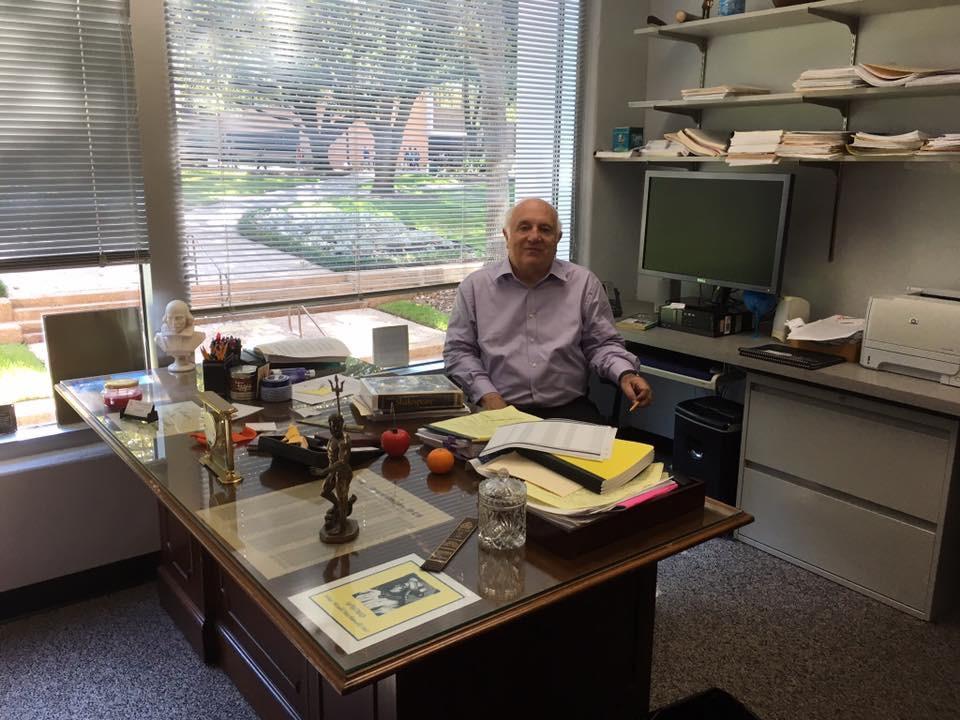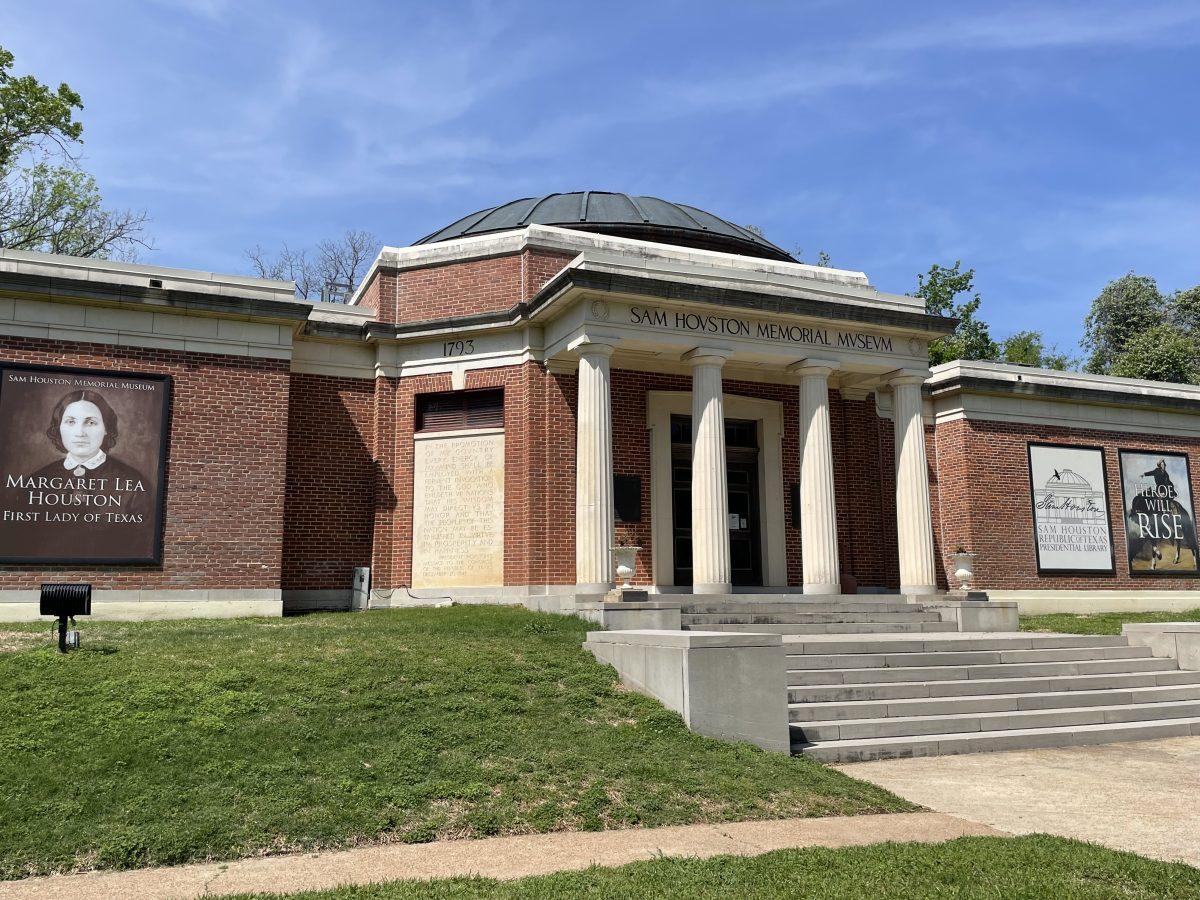“Pity Chips never had any children!”
“But you were wrong. I have. Thousands of them.’”
-James Hilton
Sam Houston State University professor Dr. Douglas Krienke once said, in a letter regarding his Excellence in Service Award nomination, “This remark is certainly applicable to me.”
As both a professor and the Associate Chair of the English Department, Krienke knows this feeling well. If serving more than 50 years at the SHSU English Department has taught him anything, it’s that his students are, by some respects, his family.
Krienke can be found in the Evans Complex teaching classes on Shakespeare, a plaque on his wall that reads, “SHSU Excellence in Teaching Award – Douglas Krienke” hanging proudly near the door. Shakespeare quotes, a black and white picture of a dog and more than a dozen more awards and degrees line his walls.
Krienke received his degree in English from Sam Houston State in 1959. By his graduation, he already had three job offers. After teaching in public schools for three years, Krienke moved to a university teaching position in Cape Girardeau, Missouri, then finally applied for a position back at his original alma matter.
His eventual return to SHSU was seemingly inevitable, a way of “coming back to his roots,” so to speak. Krienke described the changes he’s seen on campus and in students in the 50 years he’s been walking the campus grounds.
“Over the years, I’ve noticed that students have traded one addiction for another,” Krienke said. “Back in the day, class would be dismissed, and everyone would run out and congregate outside, smoking cigarettes. Now, they still run out at the end of class, but this time they’re on their cell phones. It’s not a bad thing, just something I’ve noticed.”
In 1990, Krienke was given the Sam Houston State University Excellence in Teaching Award. Over the years, he has racked up a dozen awards from the university such as the College of Humanities and Social Sciences Excellence in Teaching Award and, most recently, the Department Teaching Award for the SHSU Department of English.
More than awards, Krienke has also received several letters and emails from past students. They detail the effects Krienke’s teaching has had on their lives and careers. One letter is from a past student of his who now happens to be an SHSU English lecturer, Jonathan Antonini. “You need to know that you make a difference in people’s lives,” Antonini wrote.
“You need to know that you help students see this world through a different lens— through a lens of compassion, love, and forgiveness as we see so often in Shakespeare and the classics. You help change people’s lives. I want you to never forget that.”
With all the lives Krienke has made an impact on, he described one life that made a huge impact on him: the life of a little dog named Argus. Argus, named after Odysseus’s dog in “The Odyssey,” was a gift from the fraternity.
A few of the fraternity brothers delivered the dog that would be Argus to Krienke’s front door, along with a bag of dog food for her. Not knowing what to do with the dog, Krienke put her in the backyard.
“I went out there, and the poor little thing was pawing under the fence trying to get out,” Krienke said. “I picked her up, and she licked me. And I said, ‘Oh my Gosh.’ So I brought her in the house.”
For the next 18 years, he and Argus remained a tight-knit pair.
“She was one of the best things that ever happened in my life,” Krienke said. “I learned more about being sensitive and about being caring and being appreciative from that little dog. That was a very important part of my life.”
While he does not plan to retire anytime very soon, Krienke does have a loose plan for when he finally does.
“I would love to go to Ireland or Scotland to live,” Krienke said. “Probably Scotland. If I can’t do that, I would like to move to a beach area. I’ve always wanted to live near the water.”
Krienke has cited Chair of the English Department, Dr. Jacob Blevins, as a reason for him sticking around at SHSU for as long as he has.
“We have a chair who has just come in from a school in Louisiana, and he has a kind of vision, a kind of sense of fairmindedness that I like,” Krienke said. “He asked me not to retire yet. He said, ‘You still have a great deal to give,’ and I liked that, so I work well with him. That’s also one of the reasons I’ve stayed. We have an outstanding office staff.”
According to Blevins, Krienke’s unwavering dedication is what sets him apart from the rest.
“You would think that someone who has 50 years of service might begin to slow down, rest on his laurels,” Blevins said. “Not Dr. Krienke. He is as active, as open, and as engaged as someone fresh out of graduate school. The opportunity to work with him has been one of the true high points of my time here at Sam.”
Most recently, Krienke has been working on the Center for Ethics, Western Civilization, and American Traditions (EWCAT). EWCAT is a unique program that aims to encourage a higher level of insight in the classroom through peer-led discussions of ethical, social, political and religious issues. It aims to help students develop their own personal ethics and intellectual identity.
“My most important academic goal is to know that I have been the best teacher that I can possibly be,” Krienke said. “As a teacher I strive for that balance: to be compassionate without being weak and to be strong without being insensitive. In order for me to be remembered as a good teacher, I first have to be remembered as a good human being.”










